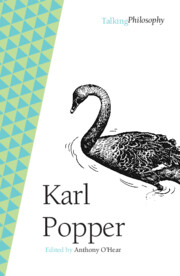Book contents
- Karl Popper
- Talking Philosophy
- Karl Popper
- Copyright page
- Contents
- Contributors
- Preface
- Introduction
- 1 Popper, Science and Rationality
- 2 Popper and Reliabilism
- 3 The Problem of the Empirical Basis
- 4 ‘Revolution in Permanence’: Popper on Theory-Change in Science
- 5 Popper’s Contribution to the Philosophy of Probability
- 6 Propensities and Indeterminism
- 7 Popper on Determinism
- 8 Popper and the Quantum Theory
- 9 The Uses of Karl Popper
- 10 Popper and Darwinism
- 11 Popper and the Scepticism of Evolutionary Epistemology, or, What Were Human Beings Made For?
- 12 Does Popper Explain Historical Explanation?
- 13 The Grounds for Anti-Historicism
- 14 What Use is Popper to a Politician?
- Works of Karl Popper Referred to in the Text
- Index
2 - Popper and Reliabilism
Published online by Cambridge University Press: 25 April 2024
- Karl Popper
- Talking Philosophy
- Karl Popper
- Copyright page
- Contents
- Contributors
- Preface
- Introduction
- 1 Popper, Science and Rationality
- 2 Popper and Reliabilism
- 3 The Problem of the Empirical Basis
- 4 ‘Revolution in Permanence’: Popper on Theory-Change in Science
- 5 Popper’s Contribution to the Philosophy of Probability
- 6 Propensities and Indeterminism
- 7 Popper on Determinism
- 8 Popper and the Quantum Theory
- 9 The Uses of Karl Popper
- 10 Popper and Darwinism
- 11 Popper and the Scepticism of Evolutionary Epistemology, or, What Were Human Beings Made For?
- 12 Does Popper Explain Historical Explanation?
- 13 The Grounds for Anti-Historicism
- 14 What Use is Popper to a Politician?
- Works of Karl Popper Referred to in the Text
- Index
Summary
Karl Popper attempted to give an account of scientific research as the rational pursuit of the truth about nature without any appeal to what he took to be the fictitious notion of non-demonstrative or inductive support. Deductive inference can be seen to be inference enough for science, he claimed, once we appreciate the power of data to refute theory. Many of the standard objections to Popper’s account purport to show that his deductivism actually entails a radical scepticism about the possibility of scientific knowledge. Some of these objections appear unanswerable in the context of the traditional analysis of knowledge as justified true belief; but this is neither a conception of knowledge that Popper himself accepted nor one that is currently in fashion. Reliabilism, the view that knowledge is a true belief generated by a reliable method, is now a popular replacement for the traditional analysis and one that is closer to Popper’s own conception of knowledge. My aim in this essay is to consider in brief compass the prospects of a reliabilist reading of Popper’s account of science. Such a reading makes it possible to turn some of the standard objections and helps to show which of Popper’s views should be accepted and which rejected.
- Type
- Chapter
- Information
- Karl Popper , pp. 48 - 68Publisher: Cambridge University PressPrint publication year: 2024

